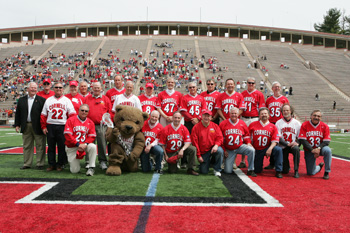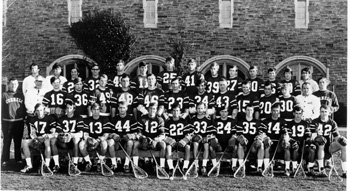Looking back: Spurned in 1970, Cornell changed the lacrosse landscape
"Do you think we showed Baltimore something? Do you think they'll rank us as high as third?"
The questions, as reported in a June 14, 1971, Sports Illustrated article by Peter Carry, were in jest and meant to drive home a point to all those who would listen. They were asked by Cornell men's lacrosse coach Richie Moran immediately following the 1971 national championship game, which the Big Red had won over Maryland, 12-6.
But to understand why these questions were asked, one must go back to 1970.
In that year, the second of Moran's 29-year career with the Big Red, the men's lacrosse team posted a perfect 11-0 record. The Big Red won the Ivy Championship outright for the third time in five years and dispatched its opponents by an average of 8.6 goals per game. The squad featured five All-Americans -- Mark Webster (first team), Jeff Dean (second team), Bob Shaw (third team), John Burnap (honorable mention) and Al Rimmer (honorable mention) -- and was widely considered the best in the Northeast.

In April, 21 players and three support staff (head coach Richie Moran, trainer Rick LaFrance and team manager Kim Eike) from the 1970 team returned to Cornell to be honored at halftime during the game against Brown on Schoellkopf Field. Photo by Tim McKinney.
Unfortunately, being the Northeast's best didn't mean much to the U.S. Intercollegiate Lacrosse Association, the governing body that awarded the "mythical" national championship to the team with the best won-lost record in the Mideastern Division, which included schools primarily from Maryland and surrounding areas.
Therefore, despite being the only undefeated team in the country, Cornell finished the year ranked fifth in the nation while Johns Hopkins (9-1), Navy (11-1) and Virginia (8-2) all shared the national championship crown, despite all having at least one loss apiece.
"Obviously, we were extremely disappointed because we played well all season," says Moran of the 1970 team. "We were hurt because we'd had a game against Virginia that was cancelled due to bad weather. I'm not saying we would have won that game, but it would have given us an opportunity to prove ourselves against the elite of the class."
Heading into the 1971 season, the returning team members knew that they would have a chance to redeem themselves with the newly created NCAA men's lacrosse tournament, which would determine the national champion through playing -- not politics.
When asked earlier this year if the snub of the 1970 team motivated him and the team the following season as it compiled a 13-1 record and etched its name in the lacrosse history books by taking the first-ever NCAA tournament title, Moran answered: "I was never that type of guy to use that as a crutch. But I didn't realize it until the reunion dinner we had a few weeks ago that a lot of the team knew about the championship.
"Many members of the 1970 team had been juniors, and they had vowed to do everything possible to get into the championship and make amends for the voting committee. It wasn't really about revenge. It was just good athletic thinking to achieve something for their teammates that they felt they deserved."
During the weekend of April 24, 2010, 21 members of the 1970 lacrosse team (and three support staff) returned to East Hill to be honored at halftime during the Big Red's game vs. Brown at Schoellkopf Field. And while that group may have a small sense that they were overlooked by the "lacrosse establishment," they don't allow bitterness to overshadow all that they accomplished.
"There is always some talk of the injustice, but we are sufficiently happy to celebrate our accomplishments and just enjoy getting together and reconnecting with each other," said Mickey Fenzel '71 after the team's reunion weekend. "Having won it all in 1971 provided us with further evidence that the 1970 team was something special as well. We had plenty of reasons to think that the 1970 team may have been even better than the 1971 team, so we know in our hearts that we were the best in the country that year also. The lacrosse world cannot challenge what took place on the field."
Julie Greco is associate director of Cornell Athletic Communications.
